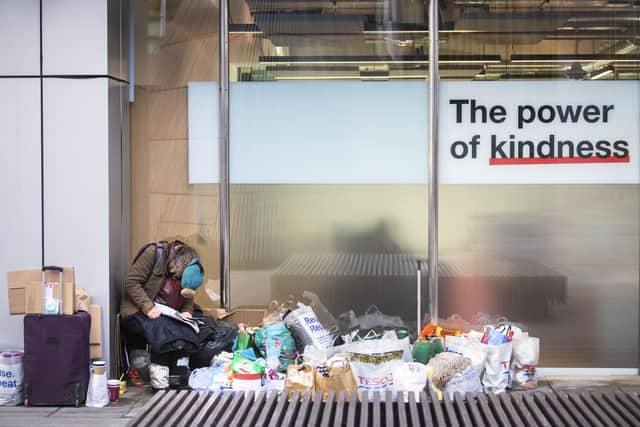Four people thought to be rough-sleeping in Wigan - as England sees a rise
and live on Freeview channel 276
The figures come as the number of rough sleepers across England rose for the first time since 2017, despite a Government manifesto promise to end rough sleeping by 2024.
Housing charity Shelter said homelessness is in a "bleak situation" with a rising number of rough sleepers and tens of thousands of households turning up at local councils asking for help.
Advertisement
Hide AdAdvertisement
Hide AdIt urged the Government to unfreeze housing benefit – which remains at 2020 levels – and build more affordable social homes.


Department for Levelling Up, Housing and Communities figures show four people were estimated to be sleeping rough in Wigan based on a snapshot of a single night in autumn last year – down from five the year before.
The Government promised to eradicate homelessness by next year, but charities have called for greater action as the total number of rough sleepers across the country rose for the first time since 2017.
The figures suggest 3,069 people were estimated to be sleeping rough in England last year – a 26 per cent rise on the 2,443 rough sleepers in 2021.
Advertisement
Hide AdAdvertisement
Hide AdPolly Neate, chief executive of Shelter, said: "Today’s figures show that more and more people are losing the battle to keep a roof over their heads. We’re facing a truly bleak situation."
Ms Neate called on the Government to unfreeze housing benefit and "build social homes with rents pegged to local incomes".
The figures also show the rate of rough sleepers has risen across the country – from 4.3 per 100,000 people in 2021 to 5.4 per 100,000 last year.
In Wigan, 1.2 per 100,000 people were estimated to be sleeping rough last year – down from 1.5 the previous year.
Advertisement
Hide AdAdvertisement
Hide AdGreater Manchester Mayor Andy Burnham said that the GM combined authority’s decision to expand its emergency accommodation provision, A Bed Every Night (ABEN), has helped prevent more people sleeping on our streets against the backdrop of the cost of living crisis.
As of January 2023, there were 582 people in ABEN on an average night with 172 people new to the system, compared to 526 people in January 2022 and 145 new move-ins. This represents a 9.6 percent increase in people using the service and a 15.6 percent increase in new people.
A Bed Every Night was set up by the Mayor of Greater Manchester in 2018 and supports people sleeping rough in Greater Manchester or those at risk of sleeping rough. This includes people who are not eligible for statutory accommodation and those who have No Recourse to Public Funds. The number of beds being provided has grown every year as more investment by GMCA, councils and other partners has been put into ABEN, including an additional 86 bed spaces to boost winter provision in the city-region.
Mr Burnham said tat because of the decisions made by Greater Manchester, it has recorded a significantly lower increase in rough sleeping than other parts of England.
Advertisement
Hide AdAdvertisement
Hide AdHomeless Link, the national membership charity for frontline homelessness organisations, said the rise in rough sleepers across England "represents a massive, collective failure".
